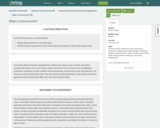52 Results

This video is produced by the Bloomfield Township, MI community media. It is from a public access program. It is posted to the Internet Archive and was discovered via https://docs.google.com/spreadsheets/d/1Vd4QiNgR59m3064dN042QwW4uULpSdihpziCMEC1qZc/edit#gid=839695847
- Subject:
- Ancient History
- History
- U.S. History
- Material Type:
- Lecture
- Author:
- John Hauser
- Bloomfield Township
- Date Added:
- 08/05/2020
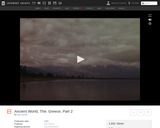
'Ancient World, The: Greece' (1955) 66m, dir. ray Garner. This film recreates the ancient Greek world through its extant art and literature. The narration is from translations of Greek authors, including Hesiod, Pindar, Aeschylus, Sophocles, Euripides, Aristophanes, Herodotus, Thucydides, Plato, and Plutarch, and accompanies visual impressions of Greek religious philosophy and history through the golden age. The film features spectacular footage of Crete, Knossos, Mycenae, and the sculptures of Athens. It discusses the Persians at Marathon, then 10 years later, Xerxes at Thermopylae. For more on Garner, visit http://www.afana.org/garner.htm
- Subject:
- Ancient History
- History
- Material Type:
- Lesson
- Author:
- Ray Garner
- Date Added:
- 08/05/2020
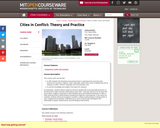
This course's aims are two-fold: 1) to offer students the theoretical and practical tools to understand how and why cities become torn by ethnic, religious, racial, nationalist, and/or other forms of identity that end up leading to conflict, violence, inequality, and social injustice; and 2) to use this knowledge and insight in the search for solutions. As preparation, students will be required to become familiar with social and political theories of the city and the nation and their relationship to each other. They also will focus on the ways that racial, ethnic, religious, nationalist or other identities grow and manifest themselves in cities or other territorial levels of determination (including the regional or transnational). In the search for remedies, students will be encouraged to consider a variety of policymaking or design points of entry, ranging from the political- institutional (e.g. forms of democratic participation and citizenship) to spatial, infrastructural, and technological interventions.
- Subject:
- Applied Science
- Architecture and Design
- Material Type:
- Full Course
- Provider:
- MIT
- Provider Set:
- MIT OpenCourseWare
- Author:
- Davis, Diane E.
- Date Added:
- 01/01/2003
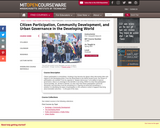
Citizen participation is everywhere. Invoking it has become de rigueur when discussing cities and regions in the developing world. From the World Bank to the World Social Forum, the virtues of participation are extolled: from its capacity to ŰĎdeepen democracyŰ to its ability to improve governance, there is no shortage to the benefits it can bring. While it is clear that participation cannot possibly ŰĎdoŰ all that is claimed, it is also clear that citizen participation cannot be dismissed, and that there must be something to it. Figuring out what that something is -- whether it is identifying the types of participation or the contexts in which it happens that bring about desirable outcomes is the goal of the class.
- Subject:
- Political Science
- Social Science
- Material Type:
- Full Course
- Provider:
- MIT
- Provider Set:
- MIT OpenCourseWare
- Author:
- Baiocchi, Gianpaolo
- Date Added:
- 01/01/2007

The Declaration of Independence is key to understanding American government. Written in June and July of 1776, by the Committee of Five (Thomas Jefferson of Virgina, John Adams of Massachusetts, Benjamin Franklin of Pennsylvania, Robert Sherman of Connecticut, and Robert R. Livingston of New York), the document was forged in a time of crisis. American colonists were engaged in a war on their own soil against their mother country, England , who possessed the most disciplined military in the world. This document was like none previously seen.
- Subject:
- Political Science
- Social Science
- Material Type:
- Textbook
- Provider:
- MIOpenBook
- Provider Set:
- Michigan Open Book Project
- Author:
- Annemarie Conway
- Hillary Baker
- Katie Hintz
- Kelly Dutcher
- Kymberli Wregglesworth
- Travis Balzar
- Date Added:
- 12/15/2017

In Democracy in America. Alexis de Tocqueville referred to America as “The Great Experiment.” But what did he mean by saying that America’s constitutional democracy was an experiment? America was founded on key principles which, are the same principles that govern our nation today. America’s Founders initiated the experiment in democracy by trying out a new form of government, including the ideas that power should ultimately come from the people, that government power should be limited, and that individual liberties of all peoples should be protected.
- Subject:
- Political Science
- Social Science
- Material Type:
- Textbook
- Provider:
- MIOpenBook
- Provider Set:
- Michigan Open Book Project
- Author:
- Annemarie Conway
- Hillary Baker
- Katie Hintz
- Kelly Dutcher
- Kymberli Wregglesworth
- Travis Balzar
- Date Added:
- 12/15/2017
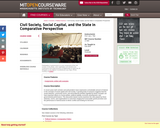
In recent years both scholars and policymakers have expressed a remarkable amount of interest in the concepts of social capital and civil society. A growing body of research suggests that the social networks, community norms, and associational activities signified by these concepts can have important effects on social welfare, political stability, economic development, and governmental performance. This discussion based course examines the roles played by these networks, norms, and organizations in outcomes ranging from local public goods provision and the performance of democracies to ethnic conflict and funding for terrorism.
- Subject:
- Political Science
- Social Science
- Material Type:
- Full Course
- Provider:
- MIT
- Provider Set:
- MIT OpenCourseWare
- Author:
- Tsai, Lily
- Date Added:
- 01/01/2004
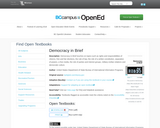
Democracy in Brief touches on topics such as rights and responsibilities of citizens, free and fair elections, the rule of law, the role of a written constitution, separation of powers, a free media, the role of parties and interest groups, military-civilian relations and democratic culture.
- Subject:
- Political Science
- Social Science
- Material Type:
- Textbook
- Provider:
- BCcampus
- Provider Set:
- BCcampus Faculty Reviewed Open Textbooks
- Author:
- United States Department of State Bureau of International Information Programs
- Date Added:
- 10/28/2014
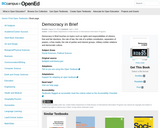
Democracy in Brief touches on topics such as rights and responsibilities of citizens, free and fair elections, the rule of law, the role of a written constitution, separation of powers, a free media, the role of parties and interest groups, military-civilian relations and democratic culture.
- Subject:
- Political Science
- Social Science
- Material Type:
- Textbook
- Provider:
- BCcampus
- Provider Set:
- BCcampus Faculty Reviewed Open Textbooks
- Author:
- United States Department of State Bureau of International Information Programs
- Date Added:
- 10/28/2014
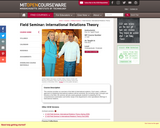
This seminar provides an overview of the field of international relations. Each week, a different approach to explaining international relations will be examined. By surveying major concepts and theories in the field, the seminar will also assist graduate students in preparing for the comprehensive examination and further study in the department's more specialized offerings in international relations.
- Subject:
- Political Science
- Social Science
- Material Type:
- Full Course
- Provider:
- MIT
- Provider Set:
- MIT OpenCourseWare
- Author:
- M. Taylor Fravel
- Date Added:
- 01/01/2011
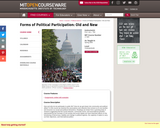
How and why do we participate in public life? How do we get drawn into community and political affairs? In this course we examine the associations and networks that connect us to one another and structure our social and political interactions. Readings are drawn from a growing body of research suggesting that the social networks, community norms, and associational activities represented by the concepts of civil society and social capital can have important effects on the functioning of democracy, stability and change in political regimes, the capacity of states to carry out their objectives, and international politics.
- Subject:
- Political Science
- Social Science
- Material Type:
- Full Course
- Provider:
- MIT
- Provider Set:
- MIT OpenCourseWare
- Author:
- Lily
- Tsai
- Date Added:
- 01/01/2005
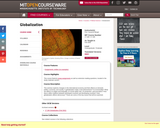
Analyzes changes in the international economy and their effects in the politics, economy, and society of advanced and emerging countries. Topics to be explored include: the independence of national governments; wage inequality; unemployment; industrial production outside national borders and its consequences for innovation, efficiency, and jobs; fairness in trade; and mass culture versus local values.
- Subject:
- Political Science
- Social Science
- Material Type:
- Full Course
- Provider:
- MIT
- Provider Set:
- MIT OpenCourseWare
- Author:
- Berger, Suzanne
- Date Added:
- 01/01/2005
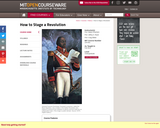
This course explores fundamental questions about the causes and nature of revolutions. How do people overthrow their rulers? How do they establish new governments? Do radical upheavals require bloodshed, violence, or even terror? How have revolutionaries attempted to establish their ideals and realize their goals? We will look at a set of major political transformations throughout the world and across centuries to understand the meaning of revolution and evaluate its impact. By the end of the course, students will be able to offer reasons why some revolutions succeed and others fail. Materials for the course include the writings of revolutionaries, declarations and constitutions, music, films, art, memoirs, and newspapers.
- Subject:
- Arts and Humanities
- Material Type:
- Full Course
- Provider:
- MIT
- Provider Set:
- MIT OpenCourseWare
- Author:
- Ghachem, Malick
- Ravel, Jeffrey
- Wilder, Craig
- Date Added:
- 01/01/2013
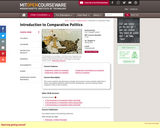
This class first offers some basic analytical frameworks -- culture, social structure, and institutions -- that you can use to examine a wide range of political outcomes. We then use these frameworks to understand (1) the relationship between democracy and economic development and (2) the relative centralization of political authority across countries. We will use theoretical arguments and a wide range of case studies to address several questions: Why are some countries democratic and others not? How does democracy affect economic development and political conflict? Why do some countries centralize power while others threaten to fall apart through secession and civil war? We will use examples from a wide range of countries including Argentina, Brazil, Germany, Iraq, Italy, Mexico, and the United States. The lessons drawn from these countries will prepare you to analyze other countries of your own choosing in the paper assignments. At the end of the course, you should be able to analyze political events around the world, drawing on the theoretical explanations provided in the class.
- Subject:
- Political Science
- Social Science
- Material Type:
- Full Course
- Provider:
- MIT
- Provider Set:
- MIT OpenCourseWare
- Author:
- Lawson, Chappell
- Date Added:
- 01/01/2006
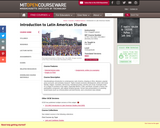
Interdisciplinary introduction to contemporary Latin America, drawing on films, literature, popular press accounts, and scholarly research. Topics include: economic development, ethnic and racial identity, religion, revolution, democratization, transitional justice, the rule of law, and the changing roles of women. Country examples draw on a range of countries in the region, especially Brazil, Chile, Colombia, and Mexico.
- Subject:
- Social Science
- Material Type:
- Full Course
- Provider:
- MIT
- Provider Set:
- MIT OpenCourseWare
- Author:
- Lawson, Chappell
- Date Added:
- 01/01/2006
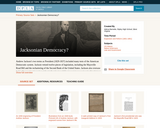
This collection uses primary sources to explore Jacksonian democracy. Digital Public Library of America Primary Source Sets are designed to help students develop their critical thinking skills and draw diverse material from libraries, archives, and museums across the United States. Each set includes an overview, ten to fifteen primary sources, links to related resources, and a teaching guide. These sets were created and reviewed by the teachers on the DPLA's Education Advisory Committee.
- Subject:
- History
- U.S. History
- Material Type:
- Primary Source
- Provider:
- Digital Public Library of America
- Provider Set:
- Primary Source Sets
- Author:
- Adena Barnette
- Date Added:
- 10/20/2015
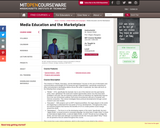
Extensive reading and discussion of case studies on educational technology that focuses on three areas: effective media design, relevant educational issues, and the existing and anticipated methods for distribution and the business concepts behind them. The primary case study is Star Festival, a multimedia curriculum about Japan that encourages users to explore issues of cultural and ethnic identity. Students expected to develop a project that shows an understanding of the types of business models that facilitate educational technology in the classroom. Graduate students are expected to explore the subject in greater depth. Taught in English.
- Subject:
- Business and Communication
- Communication
- Material Type:
- Full Course
- Provider:
- MIT
- Provider Set:
- MIT OpenCourseWare
- Author:
- Gaudi, Manish
- Miyagawa, Shigeru
- Date Added:
- 01/01/2005
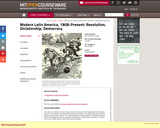
Selective survey of Latin American history from the wars of independence at the start of the nineteenth century to the present. Issues studied include: independence and its aftermath, slavery and its abolition, Latin America in the global economy, relations between Latin America and the US, dictatorships and democracies in the twentieth century, and revolution in Mexico, Cuba, and Central America.
- Subject:
- History
- World History
- Material Type:
- Full Course
- Provider:
- MIT
- Provider Set:
- MIT OpenCourseWare
- Author:
- Ravel, Jeffrey
- Date Added:
- 01/01/2005
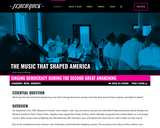
In this lesson, created in partnership with the Association for Cultural Equity, students discover the causes, characteristics, and lasting effects of the Second Great Awakening by examining the biographies of historical figures associated within the movement. They also consider how Sacred Harp Singing represents the ideals of the Second Great Awakening by watching Alan Lomax's ethnographic videos of a Sacred Harp performance.
- Subject:
- Arts and Humanities
- Performing Arts
- Material Type:
- Full Course
- Provider:
- TeachRock
- Date Added:
- 12/13/2019
